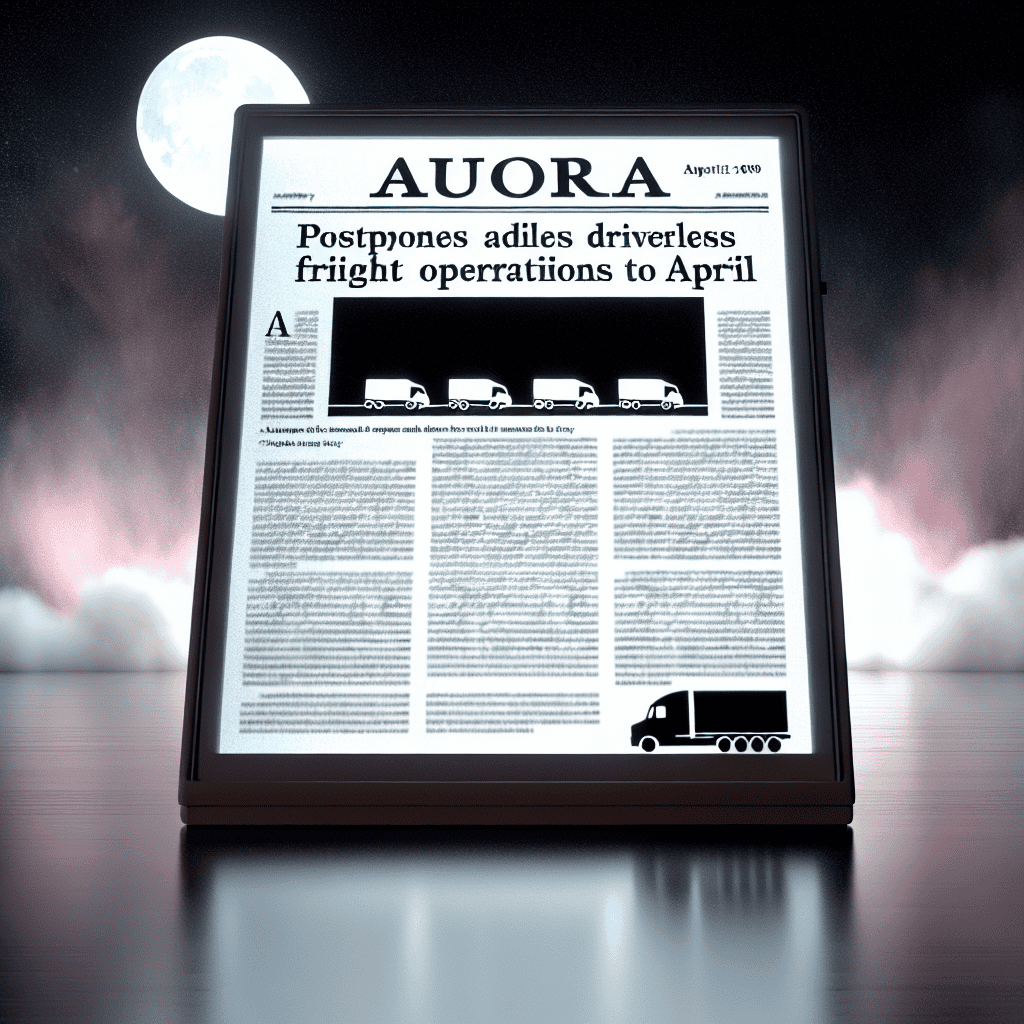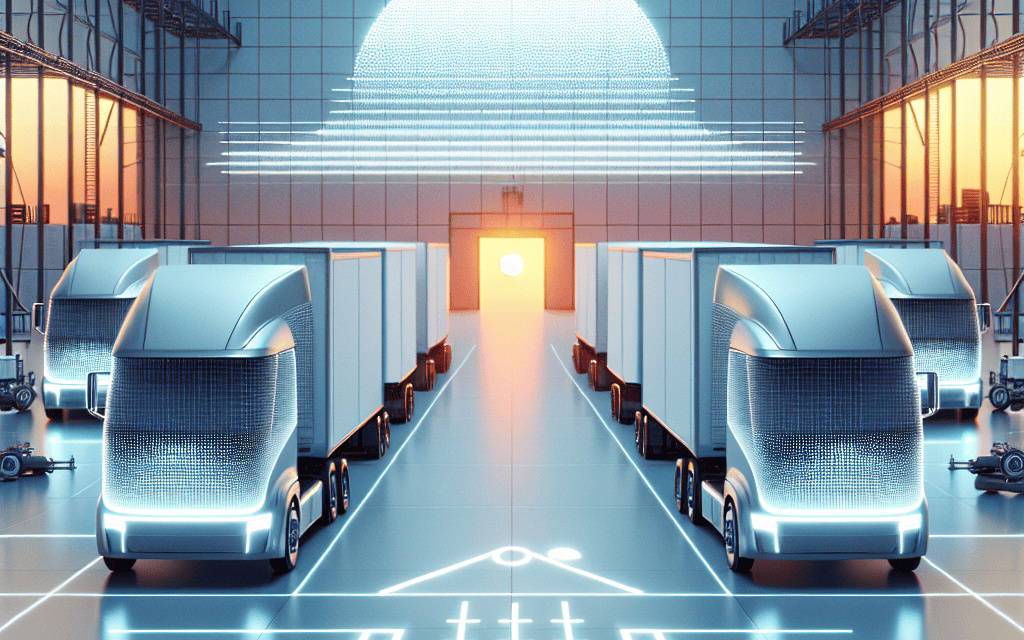“Navigating the Future: Aurora Delays Driverless Freight to Ensure Safety and Precision by April.”
Introduction
Aurora Innovation, a leading player in the autonomous vehicle industry, has announced a strategic decision to postpone the launch of its driverless freight operations until April. This delay reflects the company’s commitment to ensuring the highest standards of safety and reliability in its cutting-edge technology. Aurora’s decision underscores the complexities and challenges inherent in deploying autonomous systems on public roads, as well as the company’s dedication to addressing these challenges comprehensively before commencing operations. The postponement allows Aurora to conduct further testing and refinement of its driverless technology, ensuring that it meets both regulatory requirements and the company’s own rigorous safety benchmarks. As the industry closely watches Aurora’s progress, this move highlights the cautious and responsible approach necessary for the successful integration of autonomous vehicles into the logistics and transportation sectors.
Impact Of Aurora’s Decision On The Autonomous Vehicle Industry
Aurora Innovation, a prominent player in the autonomous vehicle industry, recently announced the postponement of its driverless freight operations to April. This decision has sparked considerable discussion within the industry, as stakeholders assess the potential implications for the broader autonomous vehicle landscape. The delay, while not entirely unexpected, underscores the complexities and challenges inherent in the development and deployment of autonomous technologies. As the industry grapples with these challenges, Aurora’s decision serves as a pivotal moment, prompting a reevaluation of timelines and strategies across the sector.
The postponement highlights the intricate balance between technological advancement and regulatory compliance. Autonomous vehicle companies, including Aurora, must navigate a labyrinth of regulations that vary significantly across jurisdictions. These regulations are designed to ensure safety and reliability, yet they often pose hurdles that can delay deployment. Aurora’s decision to delay its operations suggests a cautious approach, prioritizing safety and compliance over rapid deployment. This move may influence other companies to adopt similar strategies, potentially slowing the pace of industry-wide advancements.
Moreover, the delay reflects the technical challenges that continue to confront the autonomous vehicle industry. Developing a fully autonomous system capable of handling the complexities of real-world driving is a formidable task. Aurora’s decision indicates that, despite significant progress, there remain unresolved technical issues that necessitate further refinement. This acknowledgment of ongoing challenges may prompt increased collaboration within the industry, as companies seek to pool resources and expertise to overcome shared obstacles.
In addition to technical and regulatory considerations, Aurora’s decision also has economic implications. The autonomous vehicle industry is characterized by substantial investment, with companies vying for a share of the burgeoning market. Delays in deployment can impact investor confidence and alter financial projections. Aurora’s postponement may lead investors to reassess their expectations, potentially influencing funding strategies and valuations across the sector. However, it is also possible that the decision will be viewed as a prudent measure, reinforcing confidence in Aurora’s commitment to safety and long-term success.
Furthermore, the delay may have ripple effects on the supply chain and logistics sectors, which stand to benefit significantly from autonomous freight operations. Companies in these sectors have been eagerly anticipating the efficiencies and cost savings promised by driverless technology. Aurora’s decision to delay its operations may prompt these companies to adjust their timelines and strategies, potentially exploring interim solutions to bridge the gap until autonomous technologies become widely available.
Despite the challenges and uncertainties highlighted by Aurora’s postponement, the decision also underscores the industry’s resilience and adaptability. The autonomous vehicle sector has consistently demonstrated an ability to navigate setbacks and continue progressing toward its goals. Aurora’s decision, while a temporary setback, is unlikely to derail the industry’s momentum. Instead, it may serve as a catalyst for renewed focus and innovation, as companies strive to address the challenges that remain.
In conclusion, Aurora’s decision to postpone its driverless freight operations to April has significant implications for the autonomous vehicle industry. It highlights the ongoing challenges related to technology, regulation, and economics, while also underscoring the industry’s resilience and adaptability. As stakeholders assess the impact of this decision, it is clear that the path to widespread autonomous vehicle deployment remains complex and multifaceted. However, with continued collaboration and innovation, the industry is well-positioned to overcome these challenges and realize the transformative potential of autonomous technologies.
Reasons Behind Aurora’s Delay In Driverless Freight Operations
Aurora Innovation, a prominent player in the autonomous vehicle industry, recently announced a delay in the launch of its driverless freight operations, pushing the anticipated start date to April. This decision, while unexpected, underscores the complexities and challenges inherent in the development and deployment of autonomous technology. Several factors have contributed to this postponement, each playing a crucial role in Aurora’s strategic recalibration.
First and foremost, safety remains a paramount concern for Aurora. The company is committed to ensuring that its autonomous systems meet the highest safety standards before they are deployed on public roads. This commitment necessitates rigorous testing and validation processes, which can be time-consuming. Aurora’s decision to delay operations reflects its dedication to prioritizing safety over speed, a stance that is likely to bolster public trust in the long run. By taking additional time to refine its technology, Aurora aims to minimize the risk of accidents and ensure a seamless integration of driverless trucks into existing traffic systems.
Moreover, regulatory compliance is another significant factor influencing Aurora’s timeline. The autonomous vehicle industry is subject to a complex web of regulations that vary across different jurisdictions. Navigating this regulatory landscape requires careful planning and coordination with government agencies. Aurora’s delay may be partly attributed to the need for additional time to secure the necessary approvals and ensure compliance with all relevant regulations. This cautious approach not only helps avoid potential legal hurdles but also positions Aurora as a responsible and compliant industry leader.
In addition to safety and regulatory considerations, technological challenges also play a role in the delay. Developing a fully autonomous freight system involves overcoming numerous technical hurdles, from perfecting sensor technologies to enhancing machine learning algorithms. Aurora’s engineers are likely working diligently to address these challenges, ensuring that their systems can handle a wide range of real-world scenarios. The delay provides Aurora with the opportunity to further refine its technology, ultimately leading to a more robust and reliable product.
Furthermore, the competitive landscape of the autonomous vehicle industry cannot be overlooked. Aurora operates in a rapidly evolving market, where technological advancements and strategic partnerships are key to maintaining a competitive edge. By postponing its driverless freight operations, Aurora may be seeking to align its launch with broader industry trends or to capitalize on emerging opportunities. This strategic timing could enhance Aurora’s market position and ensure a more successful rollout.
Lastly, the delay may also be influenced by logistical considerations. Launching a driverless freight operation involves coordinating a multitude of factors, from fleet management to customer partnerships. Ensuring that all logistical elements are in place is crucial for a smooth and efficient launch. Aurora’s decision to delay may reflect the need for additional time to finalize these logistical arrangements, ensuring that the company is fully prepared to meet the demands of its customers.
In conclusion, Aurora’s postponement of its driverless freight operations to April is a multifaceted decision driven by safety, regulatory, technological, competitive, and logistical considerations. While the delay may be disappointing to some, it highlights Aurora’s commitment to delivering a safe, reliable, and compliant autonomous freight solution. By taking the necessary time to address these challenges, Aurora is positioning itself for long-term success in the burgeoning autonomous vehicle industry.
How Aurora’s Postponement Affects Stakeholders And Investors
Aurora Innovation, a prominent player in the autonomous vehicle industry, recently announced the postponement of its driverless freight operations to April. This decision has significant implications for various stakeholders and investors, who are now recalibrating their expectations and strategies in response to the delay. The postponement, while unexpected, underscores the complexities and challenges inherent in the development and deployment of autonomous technologies.
For stakeholders, particularly those in the logistics and transportation sectors, Aurora’s delay represents both a setback and an opportunity. On one hand, companies that had anticipated integrating Aurora’s driverless trucks into their supply chains must now adjust their timelines and operational plans. This could involve seeking alternative solutions or extending existing contracts with human-driven freight services. On the other hand, the delay provides these stakeholders with additional time to prepare for the eventual integration of autonomous vehicles, allowing for more comprehensive planning and adaptation to the technological shift.
Investors, meanwhile, are closely monitoring the situation, as the postponement may influence their financial strategies and expectations regarding Aurora’s market performance. The delay could lead to short-term fluctuations in Aurora’s stock value, as market confidence may waver in light of the revised timeline. However, it is essential to recognize that the autonomous vehicle industry is characterized by its long-term potential rather than immediate returns. Investors with a focus on the future may view the postponement as a prudent move by Aurora, allowing the company to refine its technology and ensure a more robust and reliable product upon launch.
Moreover, the delay highlights the regulatory and safety challenges that continue to shape the autonomous vehicle landscape. Aurora’s decision to postpone its operations may be influenced by the need to address these challenges comprehensively. Ensuring compliance with evolving regulations and prioritizing safety are critical factors that can significantly impact the successful deployment of driverless technologies. By taking additional time to address these issues, Aurora may ultimately strengthen its position in the market and enhance its reputation as a responsible and forward-thinking company.
In addition to regulatory considerations, technological hurdles also play a role in the postponement. The development of autonomous vehicles involves complex systems integration, requiring advancements in artificial intelligence, sensor technology, and data processing. Aurora’s decision to delay may reflect the need to further refine these technologies to achieve the desired level of performance and reliability. This approach, while extending the timeline, could result in a more competitive and capable product that meets the high expectations of both stakeholders and consumers.
Furthermore, the postponement offers an opportunity for Aurora to engage more deeply with its partners and collaborators. By fostering stronger relationships and open communication channels, Aurora can ensure that all parties are aligned and prepared for the eventual rollout of its driverless freight operations. This collaborative approach may lead to more seamless integration and adoption of the technology across various sectors.
In conclusion, while Aurora’s postponement of its driverless freight operations to April may present challenges for stakeholders and investors, it also offers opportunities for strategic planning and technological refinement. By addressing regulatory, safety, and technological considerations, Aurora is positioning itself for long-term success in the autonomous vehicle industry. As stakeholders and investors navigate this evolving landscape, the focus remains on the transformative potential of driverless technologies and their ability to reshape the future of transportation and logistics.
The Future Of Driverless Freight: Lessons From Aurora’s Experience

Aurora Innovation, a prominent player in the autonomous vehicle industry, recently announced a significant shift in its timeline for launching driverless freight operations, postponing the start date to April. This decision, while unexpected, offers a valuable opportunity to examine the complexities and challenges inherent in the development of driverless freight technology. As the industry continues to evolve, Aurora’s experience provides critical insights into the future of autonomous transportation and the factors influencing its progress.
The delay in Aurora’s operations underscores the intricate nature of developing and deploying driverless technology. Autonomous vehicles must navigate a myriad of technical, regulatory, and logistical challenges before they can be safely integrated into existing transportation networks. Aurora’s decision to postpone its launch highlights the importance of ensuring that these systems are thoroughly tested and refined to meet the highest safety standards. This cautious approach is essential, as the stakes are high; any misstep could have significant repercussions for public safety and the broader acceptance of autonomous vehicles.
Moreover, Aurora’s experience illustrates the dynamic regulatory environment surrounding driverless technology. As governments and regulatory bodies grapple with the implications of autonomous vehicles, companies like Aurora must remain agile and responsive to evolving legal frameworks. This often involves extensive collaboration with policymakers to establish guidelines that balance innovation with safety. The postponement of Aurora’s operations may reflect ongoing negotiations and adjustments to meet regulatory requirements, emphasizing the need for a proactive and adaptive strategy in navigating this complex landscape.
In addition to regulatory considerations, the development of driverless freight technology involves overcoming substantial technical hurdles. Autonomous systems must be capable of handling a wide range of scenarios, from routine traffic conditions to unexpected obstacles and adverse weather. Aurora’s decision to delay its operations suggests a commitment to addressing these challenges comprehensively. By taking the time to refine their technology, Aurora aims to ensure that their systems are robust and reliable, capable of performing safely and efficiently in diverse environments.
Furthermore, the postponement highlights the importance of public perception and trust in the success of driverless technology. As autonomous vehicles become more prevalent, gaining public confidence is crucial. Any incidents or failures could significantly impact public opinion and hinder the adoption of this transformative technology. Aurora’s cautious approach reflects an understanding of this dynamic, prioritizing safety and reliability to build trust with consumers and stakeholders alike.
Aurora’s experience also sheds light on the broader implications for the logistics and transportation industries. The integration of driverless freight technology promises to revolutionize these sectors, offering increased efficiency, reduced costs, and enhanced safety. However, the path to realizing these benefits is fraught with challenges, as evidenced by Aurora’s decision to delay its operations. Companies must navigate a complex interplay of technological, regulatory, and societal factors to successfully implement autonomous systems.
In conclusion, Aurora’s postponement of its driverless freight operations serves as a valuable case study in the development of autonomous vehicle technology. It highlights the multifaceted challenges that companies face in bringing these innovations to market, from technical and regulatory hurdles to public perception and trust. As the industry continues to advance, the lessons learned from Aurora’s experience will be instrumental in shaping the future of driverless freight, guiding companies toward successful and sustainable integration of autonomous systems into the transportation landscape.
Aurora’s Strategic Adjustments In The Autonomous Freight Market
Aurora Innovation, a prominent player in the autonomous vehicle industry, has recently announced a strategic decision to postpone its driverless freight operations until April. This move, while unexpected by some, reflects the company’s commitment to ensuring the highest standards of safety and reliability in its autonomous technology. As the industry continues to evolve, Aurora’s decision underscores the complexities and challenges inherent in developing and deploying driverless freight solutions.
The delay in operations is not merely a setback but rather a calculated adjustment in Aurora’s broader strategy. By taking additional time, the company aims to refine its technology and address any potential issues that could arise in real-world applications. This approach highlights Aurora’s dedication to delivering a robust and dependable product, which is crucial in an industry where safety is paramount. Moreover, this postponement allows Aurora to conduct further testing and gather more data, which will ultimately enhance the performance and safety of its autonomous systems.
In the context of the autonomous freight market, Aurora’s decision is particularly significant. The industry is characterized by rapid advancements and intense competition, with numerous companies vying to establish themselves as leaders in the field. By opting to delay its operations, Aurora is positioning itself to better compete with other industry giants. This move also reflects a broader trend within the industry, where companies are increasingly prioritizing safety and reliability over speed to market. As a result, Aurora’s decision may set a precedent for other companies to follow, emphasizing the importance of thorough testing and validation in the development of autonomous technologies.
Furthermore, this postponement provides Aurora with an opportunity to strengthen its partnerships and collaborations within the industry. By taking additional time, the company can work more closely with its partners to integrate their technologies and ensure seamless interoperability. This collaborative approach is essential in an industry where the successful deployment of autonomous systems often requires the integration of multiple technologies and expertise. Consequently, Aurora’s decision to delay its operations may lead to stronger partnerships and a more cohesive ecosystem within the autonomous freight market.
In addition to these strategic considerations, Aurora’s postponement also has implications for the regulatory landscape. As autonomous vehicles become more prevalent, regulatory bodies are increasingly focused on establishing comprehensive frameworks to ensure their safe deployment. By delaying its operations, Aurora can engage more effectively with regulators and contribute to the development of these frameworks. This proactive approach not only benefits Aurora but also helps to shape the regulatory environment in a way that supports the safe and efficient deployment of autonomous technologies.
In conclusion, Aurora’s decision to postpone its driverless freight operations until April is a strategic adjustment that reflects the company’s commitment to safety, reliability, and collaboration. By taking additional time to refine its technology and strengthen its partnerships, Aurora is positioning itself to better compete in the rapidly evolving autonomous freight market. Moreover, this decision underscores the importance of thorough testing and validation in the development of autonomous systems, setting a precedent for other companies in the industry. As the regulatory landscape continues to evolve, Aurora’s proactive approach will likely contribute to the establishment of comprehensive frameworks that support the safe deployment of autonomous technologies. Ultimately, this postponement is a testament to Aurora’s dedication to delivering a robust and dependable product, ensuring its long-term success in the autonomous freight market.
Comparing Aurora’s Timeline With Other Driverless Freight Companies
Aurora Innovation, a prominent player in the autonomous vehicle industry, recently announced a delay in the launch of its driverless freight operations, pushing the timeline to April. This decision has sparked interest and comparisons with other companies in the driverless freight sector, as the race to commercialize autonomous trucking intensifies. Understanding Aurora’s timeline in the context of its competitors provides valuable insights into the current state and future trajectory of the industry.
Aurora’s postponement is not an isolated incident in the autonomous vehicle landscape. Many companies in this sector have faced similar challenges, often resulting in adjusted timelines. The complexity of developing safe and reliable driverless technology cannot be overstated, as it involves not only technological advancements but also regulatory approvals and public acceptance. Aurora’s decision to delay reflects a cautious approach, prioritizing safety and reliability over speed to market. This strategy aligns with the broader industry trend, where companies are increasingly recognizing the importance of thorough testing and validation before commercial deployment.
Comparatively, Waymo, a subsidiary of Alphabet Inc., has been a frontrunner in the autonomous vehicle space. Waymo has been testing its driverless technology for several years and has already launched limited commercial operations in select areas. However, even with its head start, Waymo has faced its share of challenges, including regulatory hurdles and technical setbacks. This highlights the inherent difficulties in bringing driverless technology to market, regardless of a company’s experience or resources.
Similarly, TuSimple, another key player in the autonomous trucking industry, has made significant strides in developing its technology. TuSimple has been conducting pilot programs with major logistics companies, showcasing the potential of its driverless trucks. Despite these advancements, TuSimple has also encountered delays, underscoring the complexity of achieving full autonomy in freight operations. The company’s experience further illustrates that while progress is being made, the path to widespread adoption is fraught with obstacles.
In contrast, companies like Embark Trucks have adopted a more incremental approach, focusing on developing specific autonomous features rather than pursuing full autonomy from the outset. This strategy allows for gradual integration of driverless technology into existing freight operations, potentially easing the transition for both companies and regulators. Embark’s approach highlights the diversity of strategies within the industry, as companies navigate the challenges of developing and deploying autonomous vehicles.
The delay in Aurora’s timeline also brings attention to the regulatory environment surrounding driverless technology. Regulatory bodies play a crucial role in determining the pace at which autonomous vehicles can be deployed. Companies must navigate a complex web of federal, state, and local regulations, which can vary significantly across jurisdictions. Aurora’s decision to postpone its operations may reflect ongoing discussions with regulators to ensure compliance and safety.
In conclusion, Aurora’s postponement of its driverless freight operations to April is emblematic of the broader challenges faced by the autonomous vehicle industry. While the delay may seem like a setback, it underscores the importance of safety, reliability, and regulatory compliance in the development of driverless technology. By comparing Aurora’s timeline with those of its competitors, it becomes clear that the journey to commercializing autonomous freight is a complex and multifaceted endeavor. As companies continue to innovate and refine their technologies, the industry moves closer to realizing the transformative potential of driverless freight operations.
Technological Challenges Faced By Aurora In Driverless Freight Operations
Aurora Innovation, a prominent player in the autonomous vehicle industry, recently announced the postponement of its driverless freight operations to April. This decision underscores the myriad technological challenges that the company faces in its quest to revolutionize the logistics sector. As the company navigates these complexities, it becomes evident that the path to fully autonomous freight transport is fraught with obstacles that require meticulous attention and innovative solutions.
One of the primary challenges Aurora encounters is the integration of advanced sensor technologies. Autonomous vehicles rely heavily on a suite of sensors, including LiDAR, radar, and cameras, to perceive their environment accurately. These sensors must work in harmony to provide a comprehensive understanding of the vehicle’s surroundings. However, achieving seamless integration is no small feat. Each sensor type has its strengths and limitations, and ensuring that they complement each other effectively is crucial for safe and reliable operation. For instance, while LiDAR offers precise distance measurements, it can struggle in adverse weather conditions, necessitating robust radar systems to fill in the gaps.
Moreover, the development of sophisticated algorithms for decision-making and control is another significant hurdle. Autonomous vehicles must process vast amounts of data in real-time to make split-second decisions. This requires highly advanced machine learning models capable of interpreting complex scenarios and predicting potential hazards. Aurora’s engineers are tasked with refining these algorithms to ensure that the vehicles can handle a wide array of situations, from navigating busy urban environments to traversing remote highways. The complexity of these algorithms is compounded by the need for them to be both efficient and reliable, as any lapse in performance could have serious consequences.
In addition to sensor integration and algorithm development, Aurora must also address the challenge of ensuring cybersecurity. As autonomous vehicles become more connected, they are increasingly vulnerable to cyber threats. Protecting these vehicles from potential attacks is paramount, as any breach could compromise not only the safety of the vehicle but also the integrity of the entire logistics network. Aurora is investing in robust cybersecurity measures to safeguard its systems, but this remains an ongoing battle as cyber threats continue to evolve.
Furthermore, the regulatory landscape presents its own set of challenges. Autonomous vehicles operate in a complex legal environment that varies significantly across different regions. Aurora must navigate a patchwork of regulations and standards, which can be both time-consuming and costly. Ensuring compliance with these regulations is essential for the successful deployment of driverless freight operations. This requires close collaboration with regulatory bodies to help shape policies that facilitate innovation while ensuring public safety.
Finally, public perception and acceptance of autonomous freight vehicles play a crucial role in Aurora’s operations. Building trust with the public is essential for widespread adoption. This involves not only demonstrating the safety and reliability of the technology but also addressing concerns related to job displacement and the broader societal impact of automation. Aurora is actively engaging with stakeholders to foster a positive dialogue and promote understanding of the benefits that autonomous freight can bring.
In conclusion, while Aurora’s decision to postpone its driverless freight operations highlights the technological challenges it faces, it also underscores the company’s commitment to addressing these issues comprehensively. By focusing on sensor integration, algorithm development, cybersecurity, regulatory compliance, and public engagement, Aurora is laying the groundwork for a future where autonomous freight transport becomes a reality. As the company continues to innovate and refine its technology, it remains at the forefront of a transformative industry poised to reshape the logistics landscape.
Q&A
1. **What is Aurora?**
Aurora is a company specializing in the development of autonomous vehicle technology, particularly for driverless freight operations.
2. **What operations did Aurora postpone?**
Aurora postponed its driverless freight operations, which involve the deployment of autonomous trucks for transporting goods.
3. **When were the driverless freight operations originally scheduled to begin?**
The operations were initially planned to commence before the newly announced date.
4. **To what date has Aurora postponed its driverless freight operations?**
Aurora has postponed its driverless freight operations to April.
5. **Why did Aurora postpone its operations?**
The specific reasons for the postponement have not been detailed, but such delays are often due to the need for further testing, regulatory approvals, or technological refinements.
6. **How might this postponement affect Aurora’s business?**
The postponement could impact Aurora’s business by delaying revenue generation from these operations and potentially affecting partnerships or investor confidence.
7. **What are the potential implications for the autonomous vehicle industry?**
This postponement might signal challenges in the broader autonomous vehicle industry, such as technological hurdles, regulatory issues, or market readiness for driverless freight solutions.
Conclusion
Aurora Innovation has announced a delay in the launch of its driverless freight operations, pushing the start date to April. This postponement reflects the company’s commitment to ensuring the safety and reliability of its autonomous technology before full deployment. The decision likely involves further testing and refinement of their systems to meet regulatory standards and address any technical challenges. By taking additional time, Aurora aims to enhance the performance and safety of its driverless trucks, ultimately strengthening its position in the competitive autonomous vehicle industry. This move underscores the complexities and rigorous requirements involved in bringing autonomous freight solutions to market.





